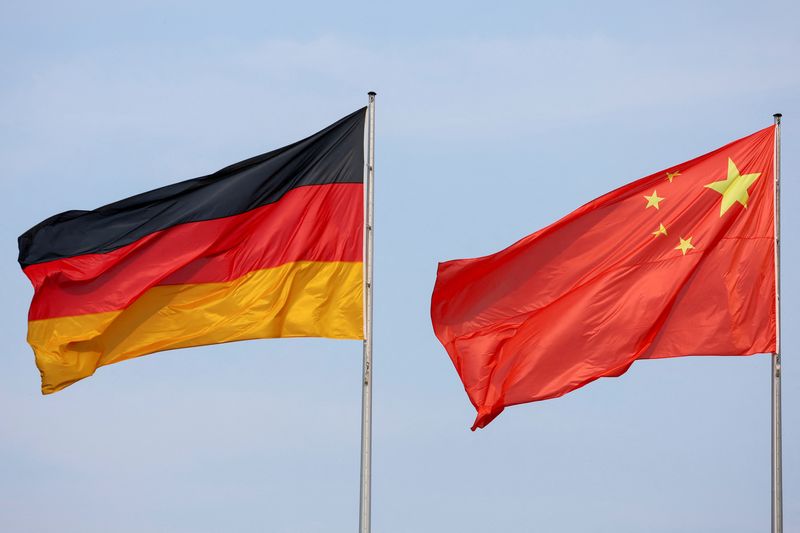By Sarah Marsh and Andreas Rinke
BERLIN (Reuters) -Germany on Thursday published its first and long-awaited China strategy which was unflinching in its appraisal of Beijing's increasing assertiveness and "unfair practises" but vague on policy measures to reduce critical dependencies.
The 64-page document comes amid a broader push in the West to reduce strategic dependence on China - which policymakers have labelled "de-risking" - amid concerns about increasing Chinese hegemony in the Indo-Pacific and broader possible supply chain disruptions.
Germany though has at times been seen as a weak link in the Western approach to China given its strong business ties with Asia's rising superpower which became the country's single biggest trade partner in 2016.
German companies and industry associations - some of which had warned against moving away from China too abruptly - widely welcomed the strategy that did not lay out any binding targets or requirements.
"China has changed. As a result of this and China's political decisions, we need to change our approach to China," said the document, which was approved by the cabinet on Thursday after months of wrangling within Chancellor Olaf Scholz's three-way coalition.
China remained an indispensable partner to tackle global challenges such as climate change and pandemics, it said. However rivalry and competition had increased in recent years as the role of the Communist Party had expanded under President Xi Jinping.
China was increasingly assertive in its attempts to change the rules-based international order with consequences for global security, it said, even as civil and political rights regressed at home.
As such Germany would continue to strengthen its military presence and cooperation with partners in the Indo-Pacific, it said, warning that the status quo of the Taiwan Strait may only be changed by peaceful means and mutual consent.
China claims self-ruled Taiwan as its own and has never renounced the use of force to bring it under its control. Taiwan says only the island's people can decide their future.
"We cannot be indifferent on the tension surrounding Taiwan," German Foreign Minister Annalena Baerbock said at an event to present the paper, which urges an expansion in relations with the island. "A military escalation would also be a danger to millions of people, worldwide, meaning also for us."
China's decision to expand its relationship with Russia also had immediate security implications for Germany, the strategy read, noting Beijing lacked credibility on its support for Ukrainian sovereignty given its embrace of Russian narratives.
Separately, the strategy said the government would review its export control lists against the backdrop of new technological developments to ensure German goods did not "encourage systematic human rights violations in China" or support further military rearmament.
It also backed the idea of potentially screening outbound investment controls on cutting-edge technology with military use - an idea the EU Commission is pursuing.
Analysts said the strategy, which markedly underscored throughout the need for close cooperation with the European Union on China, sent a clear message that Germany's approach to the country had changed, after years of prioritising bilateral economic interests.
"It’s a much-needed first class funeral for (former Chancellor Angela) Merkel’s delusions of a comprehensive strategic partnership with Xi’s China," said Thorsten Benner of the Global Public Policy Institute.
"It‘s positive that it offers a largely unvarnished take on the challenges posed by the party state".
DE-RISKING CONCEPT 'TOO VAGUE'
At now nearly 300 billion euros ($325 billion) in imports and exports, China is a core market for top German companies including Volkswagen (ETR:VOWG_p), BASF and BMW.
"China is seeking to create economic and technological dependencies with a view to using these to assert political objectives and interests," the strategy said.
The strategy urged companies to take geopolitical risks into account in their decision making "so that state funds do not have to be tapped into in the event of a geopolitical crisis". It said it would hold confidential talks with companies particularly exposed to China about their risk analyses.
Germany was reviewing whether state measures like export guarantees were reinforcing excessive dependencies and consulting whether it should develop more instruments to help reduce risks, it said.
It did not however mention possible measures like company stress tests, included in an earlier China strategy draft by the foreign ministry which is run by the Greens who are more hawkish on China than Scholz's Social Democrats (SPD).
"Berlin is speaking loudly but it is wielding a small stick. Chancellor Scholz has made clear that he sees a very narrow role for the government when it comes to de-risking," said Noah Barkin, Europe-China expert at Rhodium Group, a U.S.-based research firm.
Juergen Matthes, of the German Economic Institute, IW, said the concept of de-risking was also still too vague.
"We need a clear identification of really critical dependencies and the government should regularly monitor whether de-risking on this basis is actually advancing," he said.

China's embassy in Germany said on Thursday it hoped Germany would be rational and objective going forwards.
"Forcibly 'de-risking' based on ideological prejudice and competition anxiety will only be counterproductive and artificially intensify risks," it said.